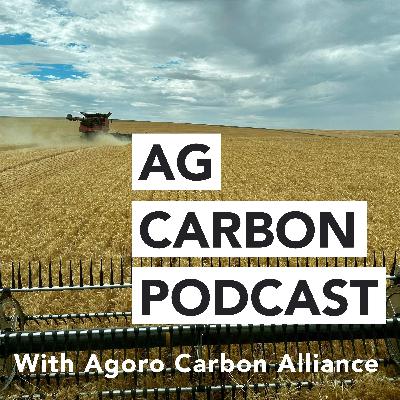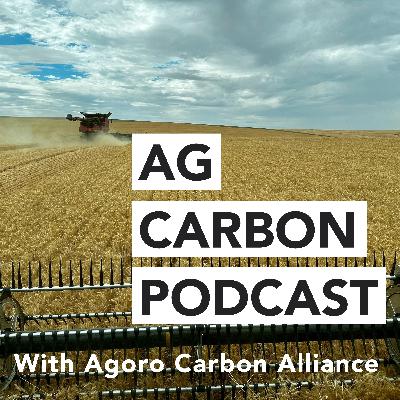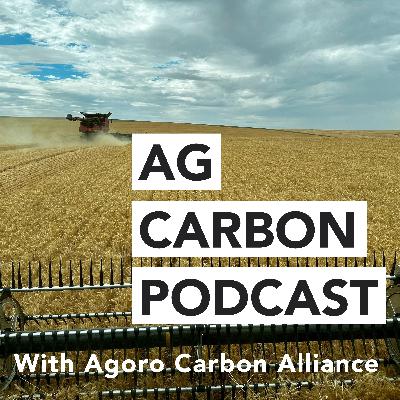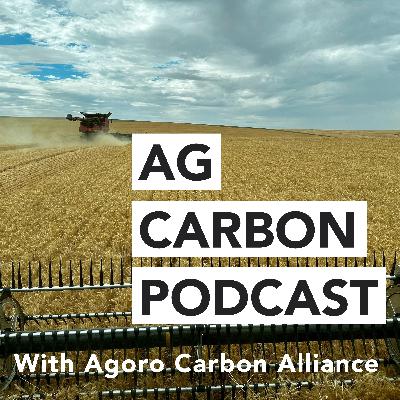Discover Ag Carbon Podcast
Ag Carbon Podcast

Ag Carbon Podcast
Author: Agoro Carbon Alliance
Subscribed: 32Played: 370Subscribe
Share
© 2024
Description
Tune in to discover the latest developments and insights in ag carbon. Each episode delves into the carbon market and nature-based soil carbon credits through discussions with industry experts, farmers, ranchers, and agronomists. Across the U.S., agricultural practitioners are adding practices like reduced/no-tillage, cover crops, rotational grazing, adding biodiversity, and fertilization. With the addition of carbon credits, these practices also provide a new revenue stream for farmers and ranchers while helping businesses meet their sustainability goals.
Join us; we're creating a solution that is grounded in soil.
Join us; we're creating a solution that is grounded in soil.
30 Episodes
Reverse
Verifying Carbon Credits: Integrity in Every Acre What does it really take to turn climate-smart farming practices into verified carbon credits? In this episode, we pull back the curtain on the verification process behind agricultural carbon projects. Joined by three Agoro Carbon team members – Chris Daley from the Carbon team, John Pullis from the Data team, and Mark Worner from the Grower Success team – we break down the science, logistics, and integrity behind every carbon credit we generate. We start with the basics: what verification is and why it matters. Then we dive into the field with Mark, who shares the real-life practices that sequester carbon, like cover cropping and no-till farming. John walks us through the rigorous soil sampling methods and explains how data drives credibility. Chris provides insight into how third-party auditors validate that our project meets the highest global standards. You’ll hear about the value verification brings – not just for carbon credit buyers -but for farmers, ranchers, and the planet. From improved soil health to greater transparency, this conversation uncovers the deeper benefits of getting it right. Whether you’re in ag, carbon markets, or just curious how climate solutions are verified on the ground, this episode is a deep and accessible dive into the process that keeps our carbon program honest, credible, and impactful. About the our guests: Chris Daley has broad experience in the carbon markets, ranging from program and methodology development to providing analysis on current and future trends. Chris has worked as a program officer at Verra and a senior associate at Ecosystem Marketplace, a Forest Trends Initiative. Mark Worner is an and agronomist and first generation farmer with a background in seed and ag chemical sales he leads our Grower Success onboarding process. Mark’s passion is to educate others about conservation agriculture Michigan’s diverse agriculture influenced John Pullis’ lifelong love for farming—from specialty crops to commodity crops. As a Senior Agronomist that focuses on soil sampling John thrives on the constant evolution and development of the agriculture industry.
In this episode, we explore the evolving landscape of carbon credit generation in Pacific Northwest agriculture. What sustainable practices are farmers and ranchers using to generate carbon credits? How does the rugged, diverse terrain of Washington, Oregon, and Idaho influence the opportunities in this market? Whether you’re familiar with the region or new to it, we’ll paint a vivid picture of the PNW’s fields, valleys, and rolling hills — and why they may offer unique advantages for ag carbon projects. “There are a lot of progressive minds in the PNW there is always producer wondering what can I do more to better my operation” -Mitch Wayment, PNW Ag Carbon Representative Plus, we tackle some of the most common questions we hear from producers and stakeholders about getting involved in the ag carbon economy. Tune in for a practical, down-to-earth conversation about where opportunities are growing.
In this episode, we dive into the world of carbon ranching and agricultural carbon sequestration. What exactly is carbon ranching, and how does it work? Join us as we break down the process—from understanding the initial steps ranchers take to establish a carbon baseline to implementing conservation practices that generate high-quality carbon credits. We'll discuss how ranchers can customize their journey, what kinds of data are collected, and how the voluntary carbon market works. Whether you're a rancher curious about joining a program or simply intrigued by this innovative approach to climate action, this episode has something for everyone! About the our guests: Kelsey Miller is an agronomist with Agoro Carbon Alliance. She comes from a ranching family, and enjoys sharing that lifestyle with her children on their homestead in Montana. She began her agronomy career young, while also serving her local FFA chapter and later the Wyoming State FFA Association. Kelsey did undergraduate research as a McNair Scholar at Montana State University, where she earned her B.S in animal science, after she worked with the USFWS at the National Bison Range. Her agricultural career continued in work with local governments, nonprofits, and in her own enterprises. Her professional skills include grazing systems, noxious weed management, mapping, monitoring, remote sensing, soil health, local food systems, animal handling, conservation ecology and more.
Join agronomists Clay Craighton (IA-based) and Tanner Pribble (IN-based) for a high level conversation about carbon sequestration on farmland or also called “carbon farming.” They discuss farm practices that capture carbon, how growers get involved, what onboarding looks like for farmers who join our carbon program, what happens after onboarding, and then the other side of carbon farming - the buyers (companies that are interested in purchasing ag-based carbon credits). Whether you are learning about agricultural carbon for the first time or wanting to brush up on the ag carbon topic or just curious about carbon programs, listen to this episode! About the our guests:Tanner Pribble lives on a farm in Northeastern Indiana with his wife Ali and sons Tatum and Tripp. Having worked in the agriculture industry for 11 years, he has enjoyed the opportunities to partner with producers every day. Based in Clear Lake, Iowa, Clay Craighton is an experienced agronomist in the Corn Belt who has worked in several realms of agriculture. Clay has worked with DuPont Pioneer and Monsanto (Bayer) and Indigo Ag. His specialty lies in soil sampling, carbon cropping, manure management and sustainability.
What does it take to ensure sustainable projects truly make an impact? Find out in this episode with Christopher Daley, Agoro Carbon's Carbon Project Development Manager. The sustainable development verified impact standard also know as "SD VISta" is the sustainability standard managed by Verra, the world’s leading standard for climate action and sustainable development. SD VISta verifies and quantifies sustainable development benefits generated from voluntary carbon offset projects. This standard ensures that certified projects not only produce measurable, sustainable development benefits but also follows best practices to protect local communities and ecosystems. Agoro Carbon Alliance works with farmers and ranchers to implement sustainable practices, like rotational grazing, biodiversity, cover crops and reduced tillage, that sequester carbon in the soil and generate carbon credits. The SD VISta standard, managed by Verra, will verify and quantify the sustainable development benefits generated from practices implemented with farmers and ranchers that partner with Agoro Carbon once registered.
Join us as we sit down with Andre Rauch, a farmer out of Lexington, OR to chat about his perspective and experience so far with carbon farming. Andre and his family run a wheat, dryland cereal, and barely operation called Starvation Farms. We dive into how Andre selected a carbon program, what the process of creating a contract with regenerative ag practices is like, what payments look like, and yes, how the name Starvation Farms came to be!
We are asked time and time again what is an "agoro." Wonder no further because in this episode Ashley Bruner, Agoro Carbon Global Marketing & Communications Manager, shares the ins and outs behind our company’s identity. And just like soil there is more than meets the eye on the surface. In this episode you’ll learn the meaning of Agoro Carbon Alliance, our origin story, and how we settled on our name.
The European Green Deal provides much-needed reason for optimism in the fight against climate change, offering a comprehensive roadmap for the EU's transition to a sustainable future. Join Christopher Chapman, Agoro Carbon Alliance's Value Chain Manager to discuss his thoughts on the recent European Green Deal and the impact on the EU economy. Over the past 7 years Christopher has worked to ensure private sector funding for climate change mitigation is directed to credible activities that contribute to sustainable development. Prior to joining Agoro Carbon, he worked for a voluntary carbon market standards organization, managing two sustainable development focused standards. Listen in to the conversation and learn about what criteria the European Commission is setting for certifying carbon removals, certification requirements, how the certification process for carbon removals will be monitored and verified, who is buying these credits and many more topics surrounding the European Green Deal's impact on carbon credit certification.
Come down memory lane and reflect on the early days (with a few stories) and how the agricultural carbon market has evolved. Get to know our US Managing Director here at Agoro Carbon Alliance, Dr. Yebin Zhao. He has been with Agoro Carbon Alliance since day one - in fact he helped start the business when there were only 3-4 people. His strong background in soil science and agronomy have helped shape Agoro Carbon. Based in Illinois, Yebin joined Agoro Carbon Alliance to help farmers and ranchers adopt soil health practices and add additional revenue to their bottom line. He is an experienced Agronomist skilled in water quality, soil fertility, and environmental awareness. Yebin has degrees from The University of Georgia, South China Agricultural University, and Shandong Agricultural University, including a doctorate in Agronomy.
In this episode, Brekke Munks, an agronomist with Agoro Carbon, and Jess Peterson, the Executive Vice President of the Society for Range Management, discuss the intricacies of ag carbon and its impact on modern agriculture. Brekke Munks' passion for agriculture began in rural Wyoming, and she earned a Ph.D. in Agronomy. Her expertise in soil health practices aims to sustain farmers and ranchers through improved soil quality. With extensive experience in agriculture policy and practical range management on his Montana ranch, Jess Peterson brings a unique perspective to the conversation. They explore how grazing producers have received the carbon program, highlighting the direct and indirect benefits, such as improved soil health, increased forage quality, and enhanced livestock production. The "Good Grazing Makes Cents" initiative is discussed, detailing its integration with carbon farming practices for maximum environmental and economic gains. The impact of the carbon credit program on range management and producers in the Western United States is examined, emphasizing additional revenue streams and positive environmental outcomes. Practical advice for producers considering carbon programs includes thorough research, asking questions, and understanding carbon credit generation. Brekke and Jess provide a comprehensive overview of ag carbon critical role in sustainable agriculture, making this episode essential for anyone interested in soil health and carbon management. How do you prefer to listen? You can listen to the episode here or on your favorite service: Spotify, Apple Podcasts, or Audible. Browse all our podcast episodes here.
The podcast featuring Christopher Daley, a Carbon Project Development Specialist, looks into the role of biodiversity in the agricultural carbon market. Daley emphasizes the importance of biodiversity, highlighting its crucial role in sustaining ecosystems and supporting agriculture. Increasing biodiversity offers numerous benefits for farmers and ranchers, including healthier soil, higher yields, and better water management. While biodiversity is becoming a focus for corporations as part of their climate-related targets, it's also essential for responsible land stewardship and consumer demand. Biodiversity credits, which have been part of the voluntary carbon market for years, are gaining traction, with frameworks like the Global Biodiversity Framework incentivizing projects to address biodiversity loss. Agoro Carbon contributes through practices such as no-tillage farming, cover crops, seeding native plants, and improved grazing practices, which support healthier and more resilient ecosystems. The future of biodiversity credits lies in projects that promote biodiversity across various landscapes, aligning with the vision of Agoro Carbon.
Let's start this new year with a new podcast episode featuring Northern Texas Rancher, Steve Rapp and his dedicated Agoro Carbon Grower Success Agronomist, Shawntel Ervin. Steve grew up in Texas and is also a mixed animal practitioner. He took over his family farm (est. 1922) where they raise cattle, cotton, wheat, and canola; he has farmed for 47 years. Steve is extremely knowledgeable in the areas of soil health and carbon sequestration with his “back to the prairie approach.” When he decided it was time to look for another source of revenue to add to his operation’s bottom line, Agoro Carbon was one of the only ag carbon companies working with ranch and pasture land. Join us in this episode to learn more about Steve’s experience before and during his participation in our carbon program. How do you prefer to listen in? Listen to the episode here, or on your favorite service: Spotify, Apple Podcasts, Audible. Browse all our podcast episodes here.
Let's zoom in on a specific and very crucial stage of the ag carbon credit generation process - the role of soil stratification. First off, what is soil stratification or also referred to as “soil strata?” Well, here is a little preview: Soil stratification is the process of dividing farm or ranch land into different areas that represent similar soil organic carbon to efficiently sample soil with the most accurate results. What does stratification look like? And how is it related to the monitoring, reporting and verification of carbon credits? Does AI and remote sensing play a part? We cover all that and more in this episode with Tommy Pudil, Agoro Carbon’s Geospatial Analyst. Tommy is a member of the science team. He is originally from eastern Iowa, and attended school at Creighton University in Nebraska, as well as Georgia Southern University in Georgia. During his time at both schools, he used remote sensing to measure the health of vegetation and map land cover using artificial intelligence and machine learning. Growing up in Iowa, farming has always been something that is important to Tommy, and he enjoys using his skills to help the mission here at Agoro Carbon Alliance. In his free time, Tommy likes to fish, hike, lift weights, and spend time with family and friends.
Come dive into the world of soil health. In this episode we dig into the relationship between soil health and profitability with Agoro Carbon Science Manager, Dr. John Shanahan. John is one of our founding scientists team members and brings over 35 years of experience as a professional agronomist in both public (Colorado State University, USDA-ARS, Soil Health Institute) and private sector (Corteva Agrisciences) roles. His expertise consists of nutrient, water, and soil health management in crop production systems. John is also proficient in the use of multiple digital farming tools for helping growers improve profitability and sustainability. Farmers and ranchers run businesses with very tight margins, so profitability is often the most significant barrier to adoption of soil health practices. Listen in to learn more details on topics like the impact of soil health practices on profitability, ag carbon’s relation to extreme weather resilience, and how yields are affected by soil health practices (cover cropping, reduce tillage, nutrient management). Resources mentioned in this episode: Sustainable & Profitable Conservation Farming: Thoughts From A Farmer Economics Of Soil Health Systems
Iowa-based Agronomist and Strategic Accounts Manager, Clay Craighton, joins us to chat through the newest way farmers can get involved in the ag carbon market - and it's all about cover cropping with legumes. Cover crops improve soil health and help keep carbon “locked in” to our soil. In this episode, Clay discusses the ins and outs of generating ag carbon credits by diversifying cover crops with legumes, and so much more: What are legumes Legacy conservation growers can participate How adding legumes to the mix works Types of legume species Application type Farmers that have been managing fields with cover cropping can now qualify to get paid and participate in the Agoro Carbon Alliance program by adding legumes to the species planted. To learn even more about cover cropping with legumes visit the Ag Carbon Knowledge Hub. If you have comments or suggestions, please visit our website or call 888-224-7423. And be sure to follow us on Facebook, Twitter, Instagram, YouTube and LinkedIn.
This week is all about women in ag. We are fortunate to have two new guests who share their early beginnings on the farm and pasture, the role of women in ag-based culture, and how it’s evolved. Their own families have lived through the rewards and challenges of farming and ranching. Their insights are eye-opening and maybe relatable to some. Kerry Hoffschneider, Communications Manager at Graze Master Genetics and host of the Underdog Ag Podcast, joins us to discuss her experience in agriculture. She was born into ag - the farm raised her. At a young age you'd find her laying pipe, helping with irrigation, and of course playing in the pasture. Today she continues her work in ag by helping producers through Graze Master Genetics. Ashley Bruner, Global Marketing Manager at Agoro Carbon Alliance, also grew up playing and working on her parent’s Illinois farm. She discusses the passion and minds of women in agriculture; plus, women’s role that have contributed to keeping agriculture alive and well from generation to generation. If you have comments or suggestions, please visit our website or call 888-224-7423. And be sure to follow us on Facebook, Twitter, Instagram, YouTube and LinkedIn.
We sat down with Kyle Henry, an Ohio rancher, who is also an Agoro Carbon Alliance member. We chat about the early onboarding process from a rancher's perspective to help others understand what exactly happens after a carbon contract is signed. He transports us to Uhrichsville, Ohio or as he says "a little slice of heaven." Kyle shares his family farm history, the transition from raising dairy to beef cattle, and his current acres of pasture enrolled in the Agoro Carbon program. Kyle takes us through the onboarding phase of our carbon program from the data collection points like herd size and pregnancy rate to the anticipation of his soil sample results. If you have comments or suggestions, please visit our website or call 888-224-7423. And be sure to follow us on Facebook, Twitter, Instagram, YouTube and LinkedIn.
This week we borrowed Markus Braaten, Market Development Manager of Digital Agronomy, from our parent company: Yara International. Yara is a respected global leader in soil fertility solutions. Markus discusses alongside Agoro Carbon’s Science Agronomist, Seth Urbanowitz, the topic of Nitrogen (N) use efficiency and Nitrogen's role in the carbon market. Together they cover topics like: How N use efficiency can increase yield, reduce emissions, and lower input costs for farmers when adopting conservation practices N removal vs. reduction Carbon emission avoidance If you have comments or suggestions, please visit our website or call 888-224-7423. And be sure to follow us on Facebook, Twitter, Instagram, YouTube and LinkedIn.
In this episode we welcome Alejandro Plastina, Associate Professor of Economics at Iowa State University alongside his former student and our Cornbelt Carbon Cropping Manager, Clay Craighton. Dr. Alejandro Plastina specializes in agricultural production and technology, with an emphasis on farm business and financial management. His research focuses on the socioeconomic drivers of conservation practices, voluntary pest resistance management, carbon programs, and agricultural productivity. He chats with us about his research and the role universities like Iowa State have in the voluntary carbon market. If you have comments or suggestions, please visit our website or call 888-224-7423. And be sure to follow us on Facebook, Twitter, Instagram, YouTube and LinkedIn.
According to the U.S. Drought Monitor, more than 80% of Texas has been facing drought conditions most of the year, and some areas for much longer. Prolonged drought can lead to crop loss, heat stress and limited feed availability for livestock, as well as increased risk of wildfires. In this episode we discuss drought conditions: how to help mitigate them, what does drought mean for your crops and soil health, and how does is impact carbon sequestration. Our guest are Texas-based agronomist Travis Kidd and Nebraska-based science agronomist John Shanahan. If you have comments or suggestions, please visit our website or call 888-224-7423. And be sure to follow us on Facebook, Twitter, Instagram, YouTube and LinkedIn.









